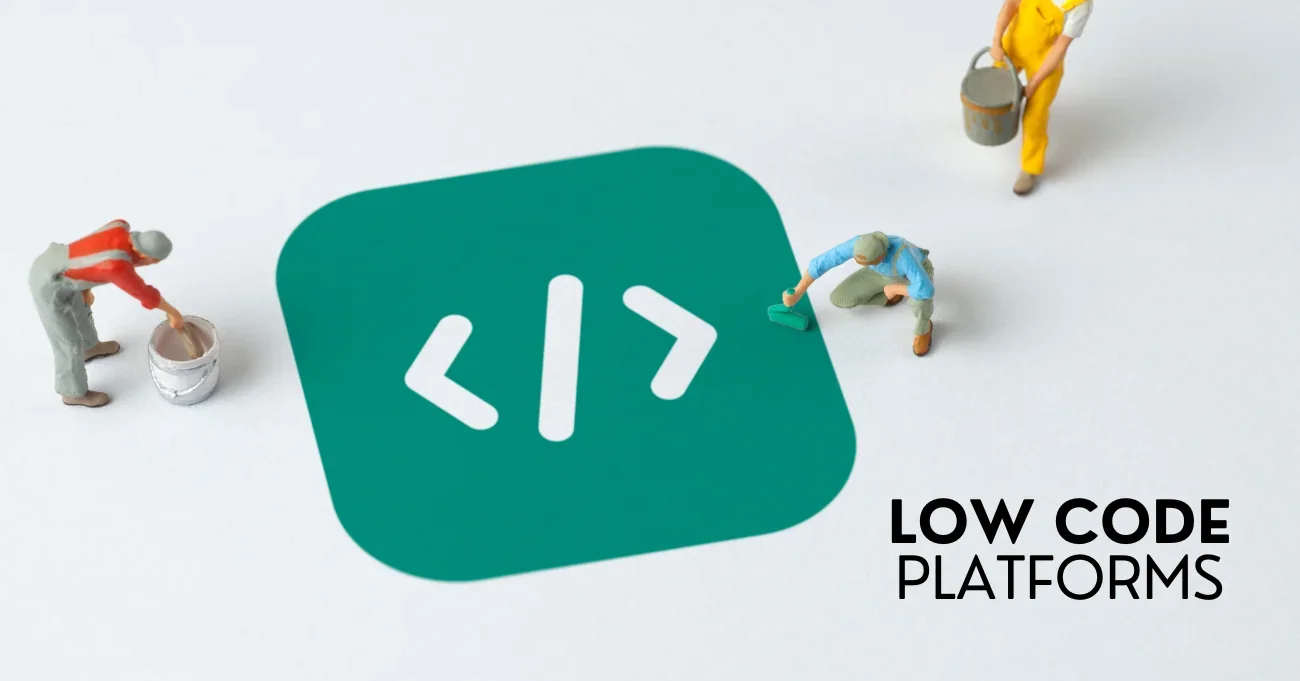Low code platforms offer businesses a game-changing solution, simplifying application development while reducing development time and technical demands. These development platforms let business users and professional developers quickly build custom applications, minimizing the coding knowledge needed and enhancing user experience. Businesses achieve rapid application development with tools that streamline business processes and support digital transformation through efficient project management frameworks and accessible graphical user interfaces.
At Aloa, we leverage our robust project management framework to deliver high-quality software solutions. Our team collaborates with vetted development teams, using the latest application development platform landscape tools to drive digital transformation initiatives for our clients. We integrate advanced features into projects to streamline business processes and enhance user experience. With access to a visual development environment, business logic tools, and project management support, Aloa ensures seamless code development across varying skill levels.
Given our analysis, this guide explores the top low code platforms, highlighting each platform's key features and pricing. By the end, you'll understand how these platforms streamline application development, support business users and developers, and drive digital transformation.
Let's get started!
What Are Low Code Development?
Low code development is a software development approach that reduces the need for extensive coding. It uses a code development platform with visual tools, making it ideal for those with minimal technical expertise. Low code platforms streamline the development process, allowing for faster deployment of enterprise applications, business apps, and mobile apps without deep programming knowledge.
Here are the key components of low code development:
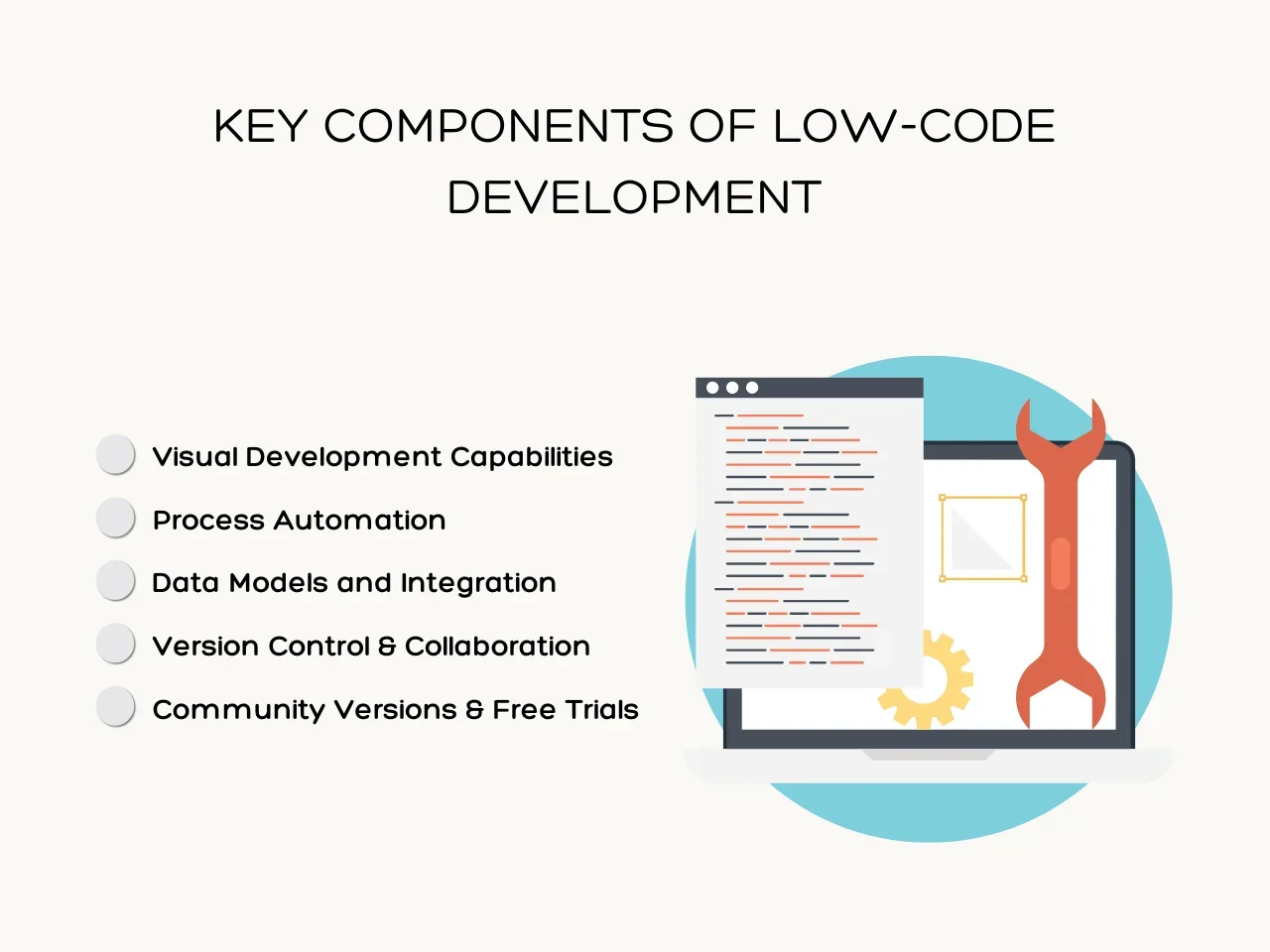
- Visual Development Capabilities: Users use a graphical interface to create custom business logic and process management workflows.
- Process Automation: Speeds up repetitive tasks and integrates with business apps, reducing the need for custom code.
- Data Models and Integration: Low code platforms provide data models compatible with legacy systems and offer development cycles that update internal and mobile apps seamlessly.
- Version Control and Collaboration: Allows multiple citizen developers to manage updates through version control, ensuring organized custom business applications.
- Community Versions and Free Trials: Platforms often offer community versions or free trials, supporting teams with little coding experience in creating web apps and internal applications.
Low code development transforms the traditional landscape, allowing businesses to create efficient applications without extensive coding. These platforms offer a practical solution for modern development processes with integrated development environments, reducing the need for intense coding expertise and supporting rapid innovation.
Top 10 Low Code Platforms to Accelerate App Development in 2024
Low code app development offers businesses and developers a streamlined approach to creating applications quickly and efficiently. With user-friendly interfaces and minimal coding requirements, these platforms are transforming the app development process. Here are the top 10 low code platforms 2024 that can accelerate your development journey.
1. OutSystems – Best for Comprehensive Enterprise Solutions
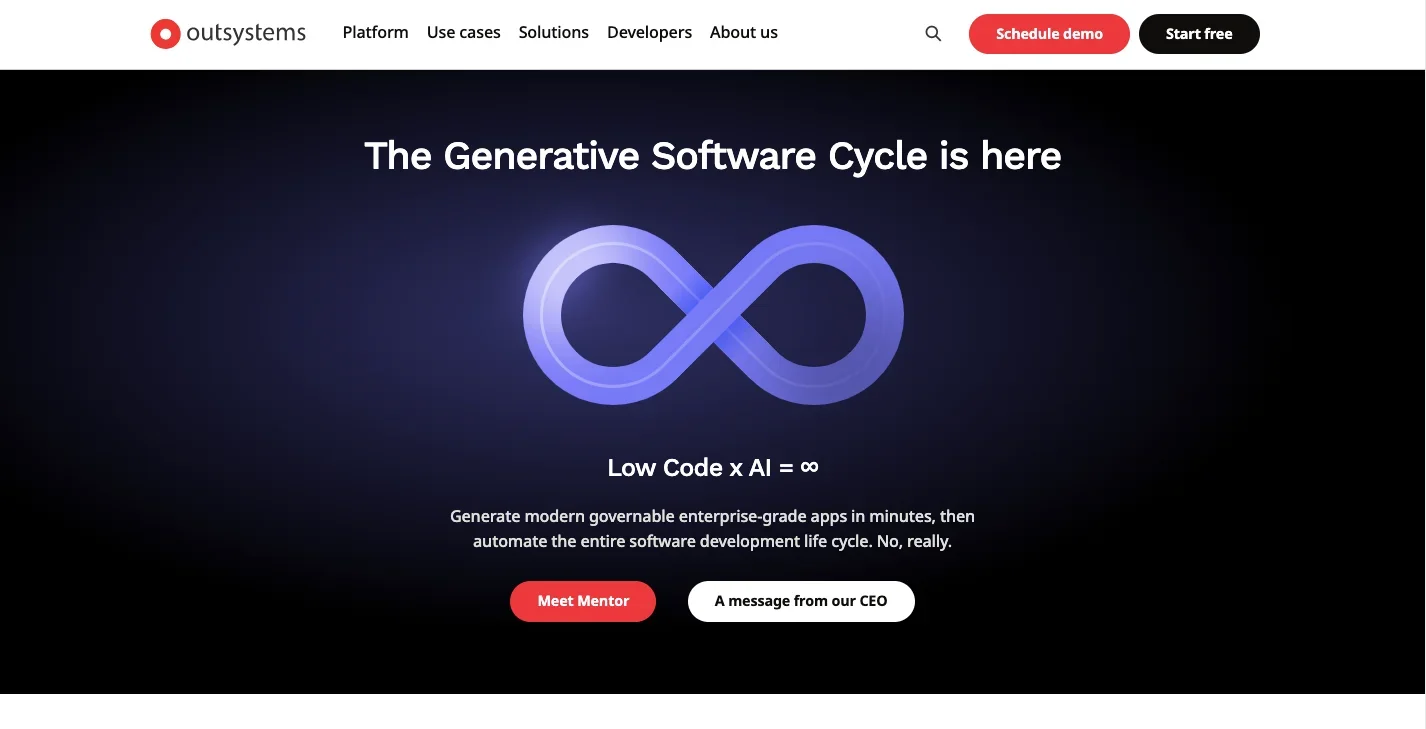
OutSystems is a low code platform that provides end-to-end solutions for enterprises needing complex, business-critical applications. It offers built-in AI tools, automated testing, and DevOps capabilities, which make it best for large organizations looking to accelerate app development without compromising functionality. OutSystems allows for rapid application delivery while managing the entire lifecycle of enterprise-grade applications.
Notable Features of OutSystems
- AI-Enhanced Development: OutSystems integrates AI capabilities that streamline coding tasks, enabling faster app development with quality checks.
- Unified DevOps Tools: With built-in DevOps, teams can automate app deployment and management, ensuring continuous improvement.
- Advanced Security Compliance: OutSystems includes enterprise-grade security, meeting compliance standards such as ISO 27001 and SOC2.
- Integration Support: OutSystems supports seamless integration with third-party systems like Salesforce and SAP, facilitating data unification.
OutSystems Pricing Plans
OutSystems offers flexible pricing designed to accommodate different enterprise needs:
- Developer Cloud: Starts at $36,300 per year, suitable for production-level applications with internal and external users.
- Free Plan: Allows up to 100 users, ideal for testing low code platform features.
OutSystems’ low code platforms serve industries like finance, healthcare, and government, with high application demands. Organizations in these sectors benefit from OutSystems’ capability to build secure, scalable solutions that integrate with existing systems, allowing for faster digital transformation and increased operational efficiency.
2. Mendix – Best for Streamlined Enterprise App Development
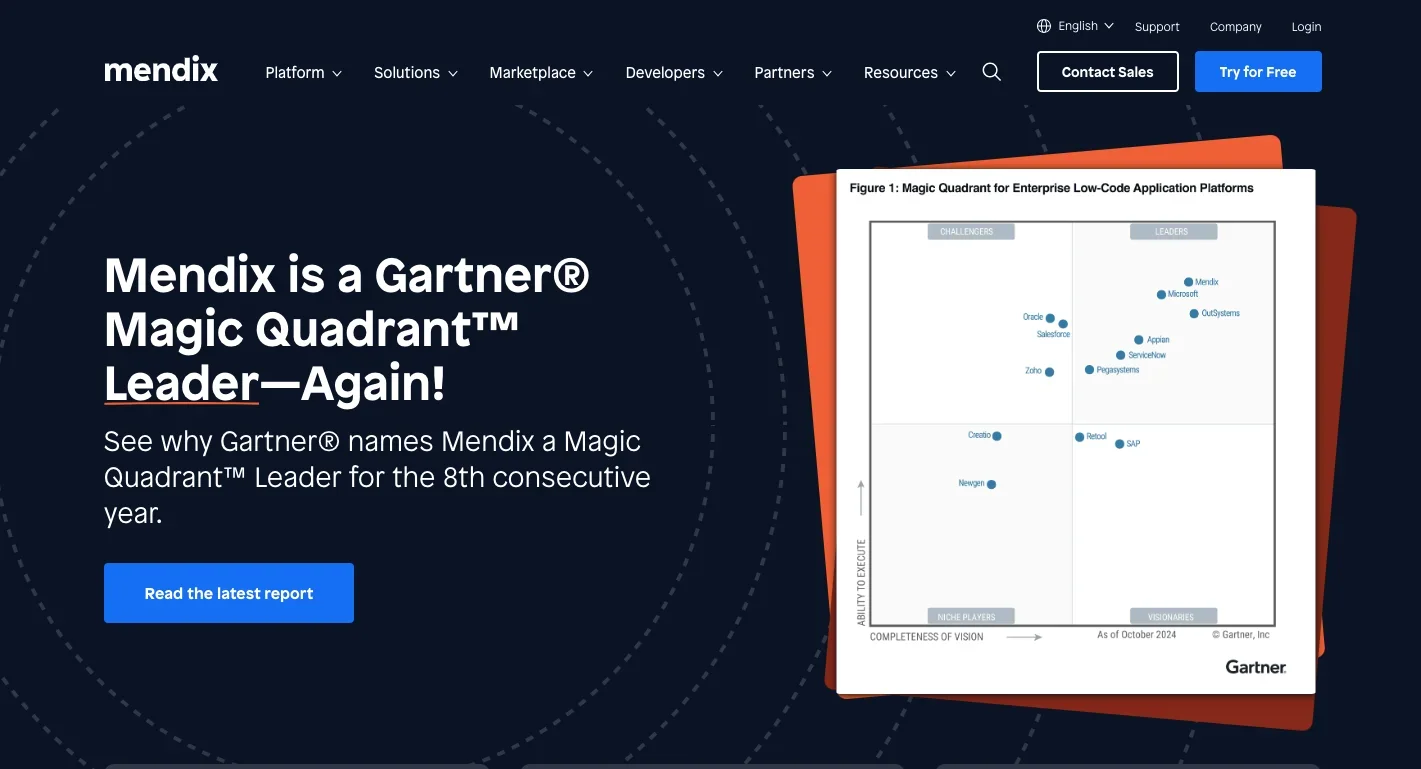
Mendix accelerates application development with features suited for complex, enterprise-level solutions. Its low-code application development platform provides extensive AI tools, a model-driven IDE, and cloud-native deployment, making it best for businesses that need to deliver secure, high-quality applications across multiple devices rapidly. Mendix enables teams to build sophisticated applications with integrated collaboration tools and intuitive interfaces.
Notable Features of Mendix
- AI-Enhanced Development Assistance: Mendix’s AI-powered tools support developers through recommendations and error-checking, speeding up complex projects.
- Unified DevOps and Deployment: Cloud-native and CI/CD compatible, Mendix allows seamless deployment across public, private, and hybrid cloud environments.
- Comprehensive Security: Built-in governance and security features help maintain compliance with customizable access control for enterprise applications.
- Cross-Platform Flexibility: Mendix supports multiple device compatibility, including iOS, Android, and progressive web applications, ensuring consistent user experiences.
Mendix Pricing Plans
Mendix offers flexible pricing tailored to different business sizes:
- Free Plan: €0/month, ideal for small teams testing platform capabilities.
- Basic Plan: Starting at €52.50/month for simple workgroup applications.
- Standard Plan: €900/month, suitable for department-level applications.
- Premium Plan: Contact for pricing, designed for mission-critical systems with advanced features.
Mendix's low code platforms benefit industries like finance, manufacturing, and public sector organizations that need reliable, scalable solutions. These sectors value Mendix’s robust integration options, which enable seamless data sharing across systems. Its low-code capabilities streamline the development of high-demand applications essential to business growth and operational efficiency.
3. Blup – Best for Seamless Flutter App Development
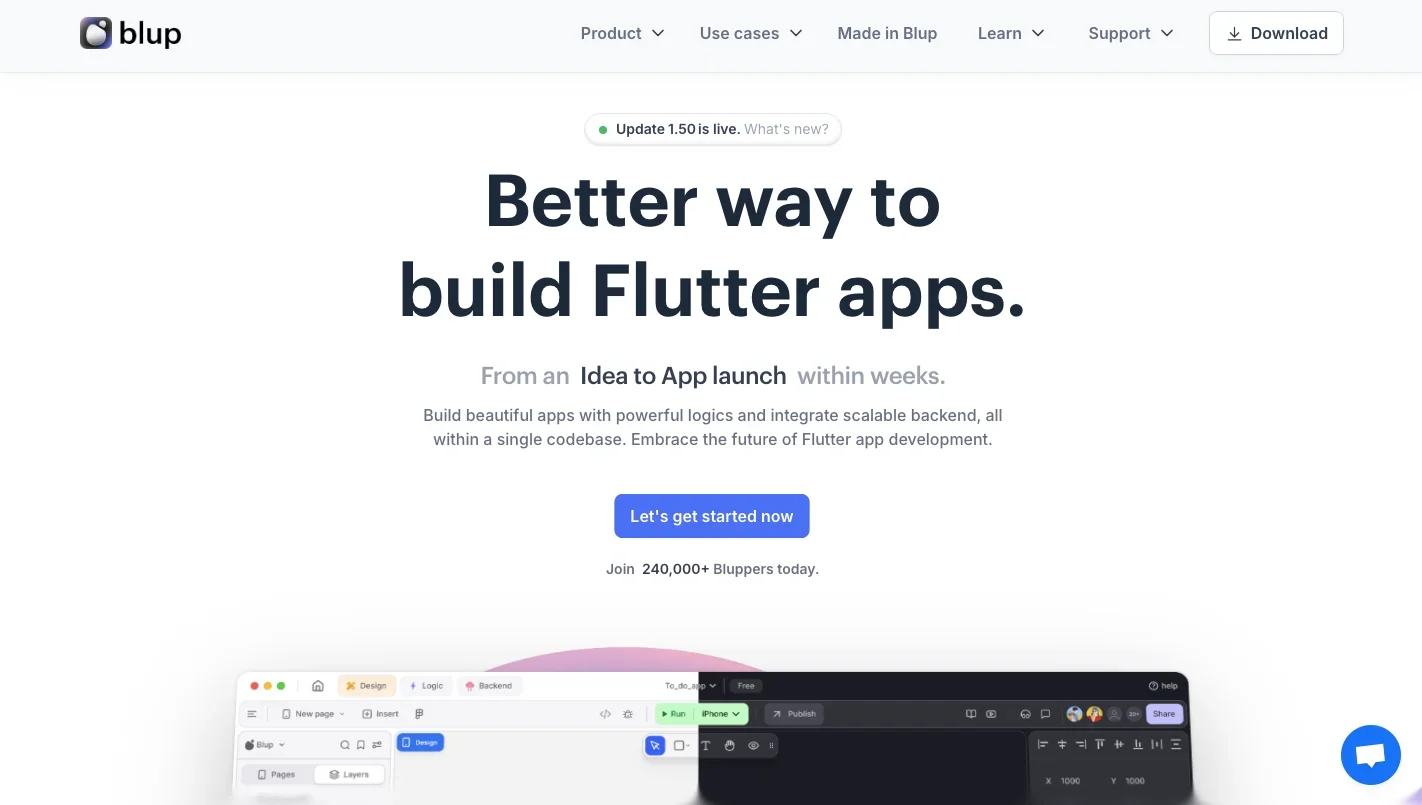
Blup simplifies the creation of the Flutter app for hobbyists, developers, and businesses. The platform’s low-code tools allow for custom coding, design integration, and publishing across multiple platforms, making it ideal for teams looking to bring apps to market quickly. Blup’s offerings support complex logic and backend integration, catering to a range of low code platform needs, from simple hobby apps to commercial-grade solutions.
Notable Features of Blup
- Comprehensive Design Tools: Blup provides a Figma-like interface, enabling seamless layout creation and direct export to Flutter code.
- Customizable Backend: Blup’s pre-built backend manages requests and storage, scaling as projects grow, with options for custom APIs and integrations.
- Cross-Platform Publishing: Publish apps on Android, iOS, and the web with built-in hosting and custom domain support.
- Third-Party SDK Integration: Effortlessly integrate third-party SDKs to enhance app functionality and streamline operations.
Blup Pricing Plans
Blup’s pricing is structured to suit various needs:
- Free Plan: Ideal for hobbyists, includes up to 3 pages with basic backend and Figma imports.
- Blup Mini: $5.98/month for small projects, offering up to 8 pages, custom coding, and app store publishing.
- Blup Basic: $38/month, suitable for personal use with unlimited pages and extensive backend support.
- Blup Pro: $86/month, designed for commercial apps with unlimited pages, dedicated support, and robust backend capacity.
Blup serves startups, freelance developers, and businesses looking to scale digital projects efficiently. Agencies developing multiple mobile apps benefit from Blup’s intuitive design, powerful backend, and low code platform customization, helping them meet clients’ demands while minimizing costs and time to market.
4. Microsoft Power Apps – Best for Integration with Microsoft Services
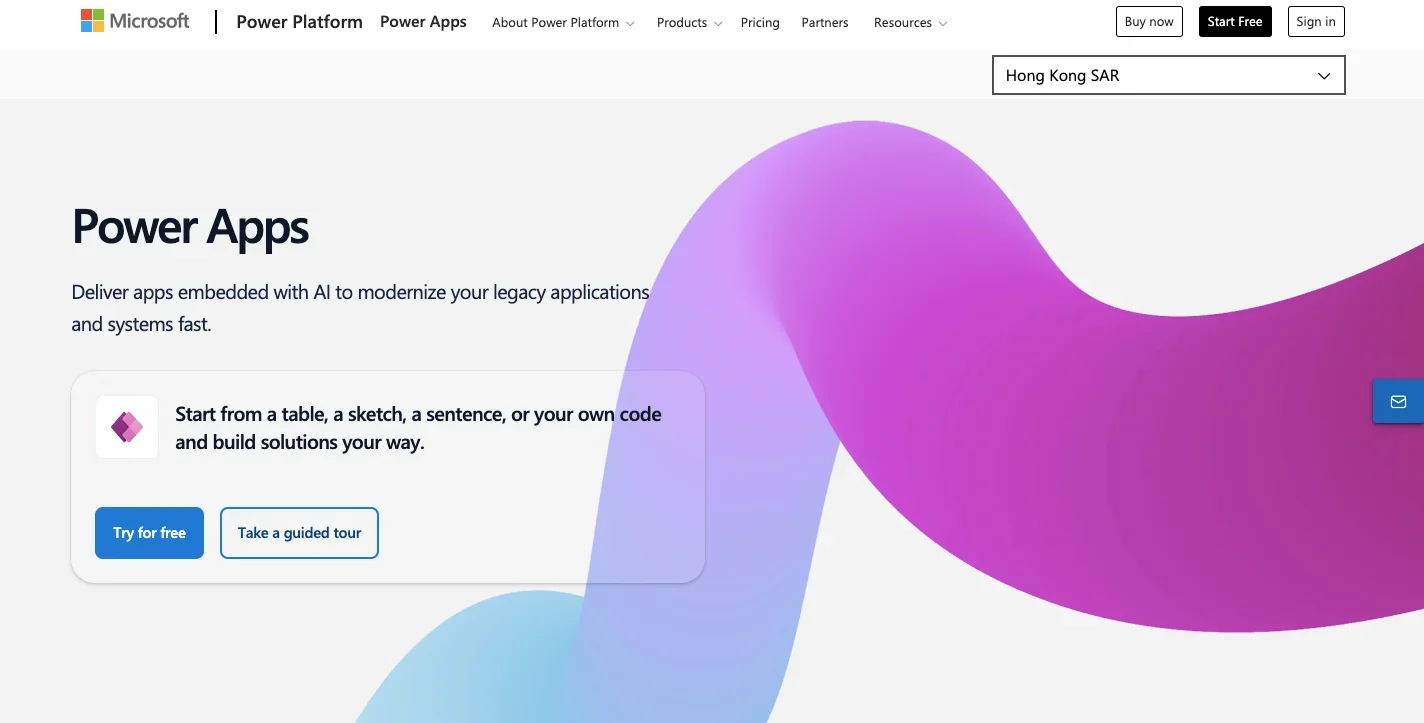
Microsoft Power Apps provides a powerful low code platform for businesses to develop apps for complex enterprise needs. It offers extensive customization options and integrates seamlessly with Microsoft services like Azure, Dynamics 365, and Teams, making it best for organizations that need scalable, secure low-code platforms to modernize workflows. Power Apps’ AI-powered features allow users to create applications through natural language input, simplifying app development.
Notable Features of Microsoft Power Apps
- AI-Driven Design Assistance: Microsoft Power Apps Copilot helps users design applications from descriptions, accelerating the development process with minimal coding.
- Data Security and Governance: Built on Microsoft’s Dataverse, Microsoft Power Apps offers advanced data governance, ensuring compliance across organizational apps.
- Integration with Microsoft Ecosystem: Microsoft Power Apps easily integrates with Microsoft services like Azure and Dynamics 365, extending its functionality and connectivity.
- Mobile and Web Compatibility: Applications built with Microsoft Power Apps are optimized for mobile and desktop use, providing flexibility for end-users.
Microsoft Power Apps Pricing Plans
Microsoft Power Apps offers tiered pricing to meet varying needs:
- Developer Plan: Free, ideal for developing and testing apps before production.
- Premium: $20 per user/month, providing unlimited app deployment and access to advanced tools.
Microsoft Power Apps serves industries such as finance, healthcare, and retail, where streamlined data management and automation are essential. Its low code platforms support organizations in transforming legacy systems, enabling rapid app creation to optimize productivity and enhance customer experiences with minimal development time.
5. Appian – Best for Process Automation

Appian combines low-code development with advanced process automation, enabling businesses to create applications that streamline complex workflows. The Appian platform excels at orchestrating and automating processes, making it ideal for organizations that optimize operational efficiency. Appian’s low code platforms offer tools for building applications quickly while maintaining robust automation capabilities, supporting businesses in automating repetitive tasks and gaining process insights.
Notable Features of Appian
- Process Orchestration: Appian provides a centralized platform for orchestrating processes, ensuring seamless workflow collaboration.
- Data Fabric Integration: The data fabric feature allows organizations to unify data from multiple sources, improving decision-making and enhancing application functionality.
- AI-Powered Automation: With built-in AI, Appian automates complex tasks, enabling quicker and more accurate workflow execution.
- Process Intelligence: Appian offers insights into process performance, allowing organizations to identify and optimize bottlenecks.
Appian Pricing Plans
Appian offers various pricing tiers tailored to enterprise needs:
- Standard Plan: Priced per user per month, includes basic support and essential process automation tools.
- Advanced Plan: Includes access to five robotic process automation (RPA) bots and enhanced data capabilities.
- Premium Plan: Provides unlimited RPA bots and advanced AI features for comprehensive automation.
For specific pricing details, contact Appian directly to receive a quote based on your organization’s requirements.
Appian’s low code platforms serve industries like financial services, healthcare, and public sector organizations, where efficient process automation is essential. Businesses in these sectors rely on Appian to improve compliance, streamline operations, and enhance customer experiences through faster, more accurate service delivery.
6. Salesforce Lightning – Best for CRM-Focused Applications
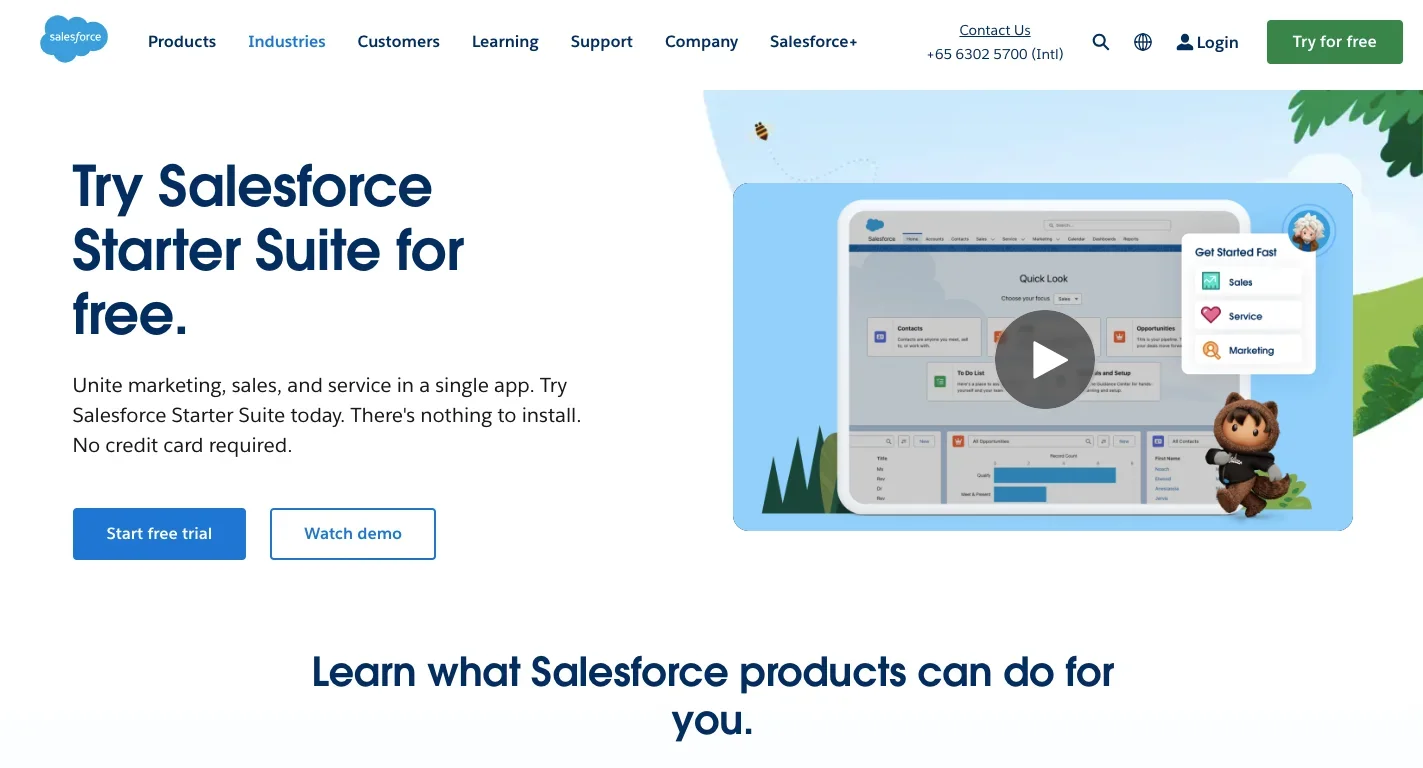
Salesforce Lightning enables the creation of custom applications focused on customer relationship management, leveraging the full power of the Salesforce ecosystem. With its low code platform, Salesforce Lightning allows business users, developers, and admins to build CRM-focused applications that integrate seamlessly across sales, service, and marketing functions. Salesforce Lightning best suits organizations seeking to unify customer interactions and manage data centrally within a single platform.
Notable Features of Salesforce
- App Builder: Allows users to create dynamic CRM applications without code, offering drag-and-drop functionality to speed up development.
- Data Cloud: Integrates and synchronizes customer data across various systems, providing a complete customer view.
- Salesforce Flow: Enables real-time, automated workflows that enhance productivity and reduce manual efforts across departments.
- DevOps Center: Centralizes project tracking, enabling efficient management of application development stages in a single environment.
Salesforce Pricing Plans
Salesforce Lightning offers various pricing plans tailored to different organizational needs:
- Platform Starter: $25/user/month, providing essential CRM tools for small teams.
- Platform Plus: $100/user/month, designed for larger teams with extended CRM requirements, including 110 custom objects and access to the Lightning Console.
Salesforce Lightning serves industries that prioritize customer relationships and data integration, such as retail, finance, and healthcare. These sectors benefit from Salesforce Lightning’s ability to streamline CRM workflows, centralize customer insights, and offer scalable solutions that adapt to evolving customer needs.
7. Kissflow – Best for Enterprise-Friendly Collaboration
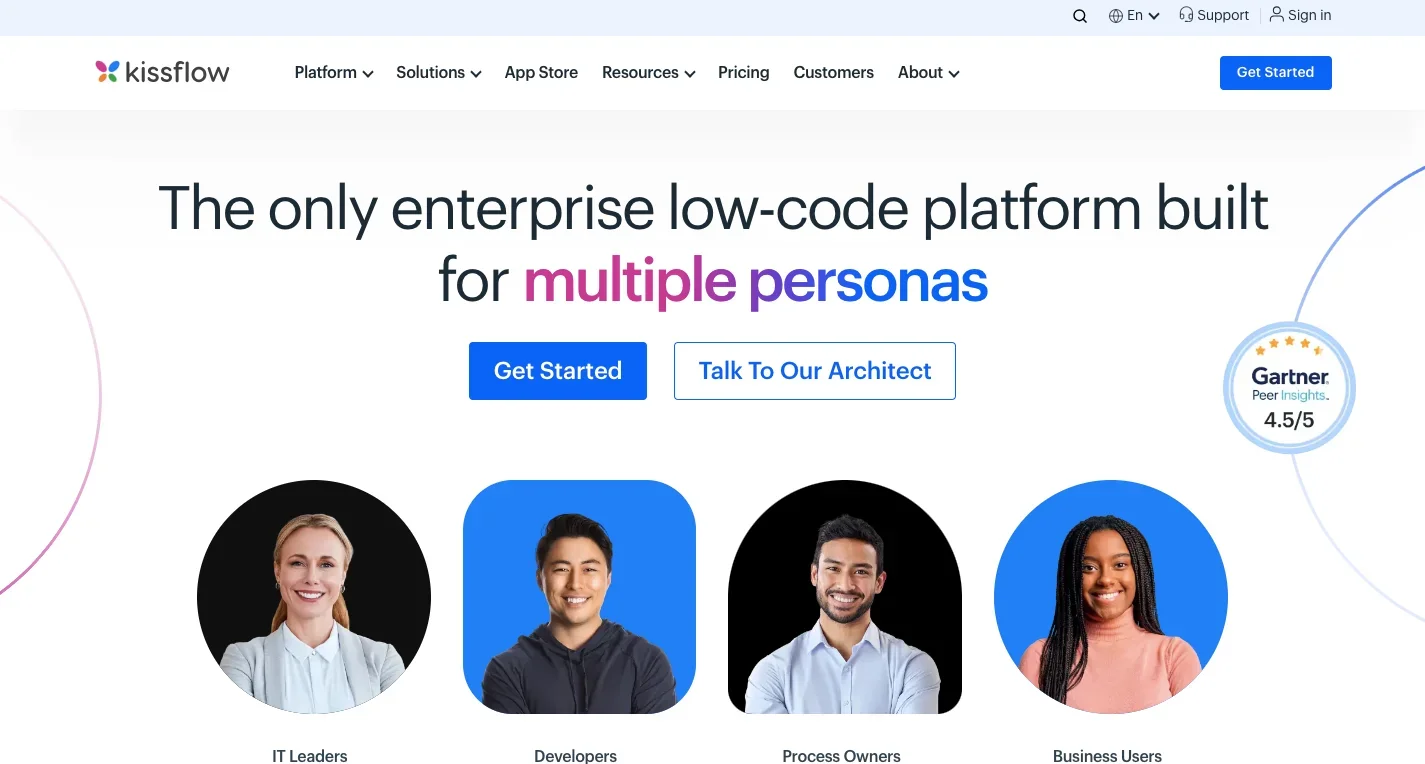
Kissflow is designed to bridge the gap between IT and business teams, making it ideal for enterprises looking to streamline application development. Its low code platforms combine the ease of no-code with low-code power, enabling organizations to quickly create, deploy, and manage applications without extensive technical expertise. It’s best for businesses seeking a unified platform to enhance collaboration and efficiency in digital transformation initiatives.
Notable Features of Kissflow
- Unified Console: Provides a single platform where business and IT teams can collaboratively build and manage applications, improving alignment and reducing silos.
- Drag-and-Drop Interface: The user-friendly design allows teams to build enterprise-level applications using simple drag-and-drop functionality, minimizing the need for code.
- Enterprise-Grade Security: This product offers comprehensive security features to protect sensitive data and maintain regulatory compliance, which is crucial for large organizations.
- Scalability: Kissflow supports the creation of unlimited applications, allowing businesses to scale their digital processes as needed.
Kissflow Pricing Plans
Kissflow provides scalable pricing suited to enterprise needs:
- Basic: Starts at $1,500/month for 50 users, ideal for simple use cases.
- Enterprise: Custom pricing is available for complex use cases and includes private clusters and internal and external users.
Industries like banking, healthcare, and retail benefit most from Kissflow’s low-code platform. These sectors benefit from Kissflow’s ability to streamline internal processes, enable quick response to market demands, and allow non-technical teams to drive innovation through application development without extensive reliance on IT.
8. Zoho Creator – Best for Small to Medium-Sized Businesses
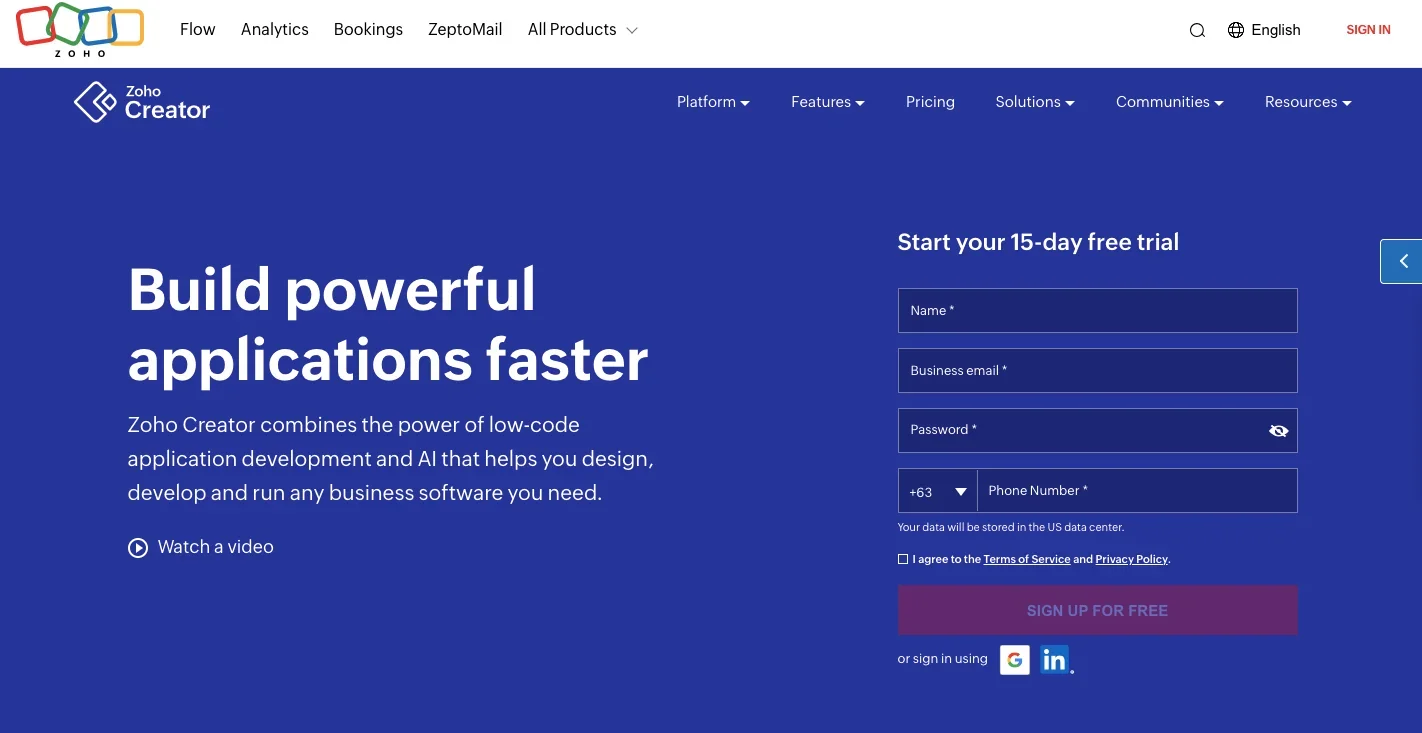
Zoho Creator is a low code platform that allows small- and medium-sized businesses to build custom applications easily. It combines drag-and-drop functionality with built-in AI capabilities, making it ideal for companies seeking cost-effective, customizable applications. Zoho Creator supports many business functions, from employee management to customer portals, without requiring extensive coding knowledge.
Notable Features of Zoho Creator
- Multi-Device Compatibility: Apps created on Zoho Creator work seamlessly across the web, iOS, and Android, ensuring accessibility on any device.
- Workflow Automation: Zoho Creator automates tasks like sending notifications, updating CRMs, managing approvals, and boosting productivity.
- Prebuilt Integrations: Connect with over 800 third-party applications, allowing businesses to centralize operations within a single platform.
- Data Security: Zoho Creator prioritizes data protection with features like encryption, multi-factor authentication, and compliance with GDPR and ISO standards.
Zoho Creator Pricing Plans
Zoho Creator provides affordable plans tailored for small and medium-sized businesses:
- Standard: $8/user/month, suitable for basic applications.
- Professional: $20/user/month, offering additional app customizations and integrations.
- Enterprise: $25/user/month, ideal for more complex, core solutions.
Zoho Creator’s low code platforms benefit industries like retail, education, and services, where custom, scalable applications are essential for managing workflows. Small to medium-sized businesses in these sectors gain from Zoho Creator’s capacity to streamline operations, enhance customer engagement, and optimize business processes effectively.
9. Quick Base – Best for Building Scalable Applications
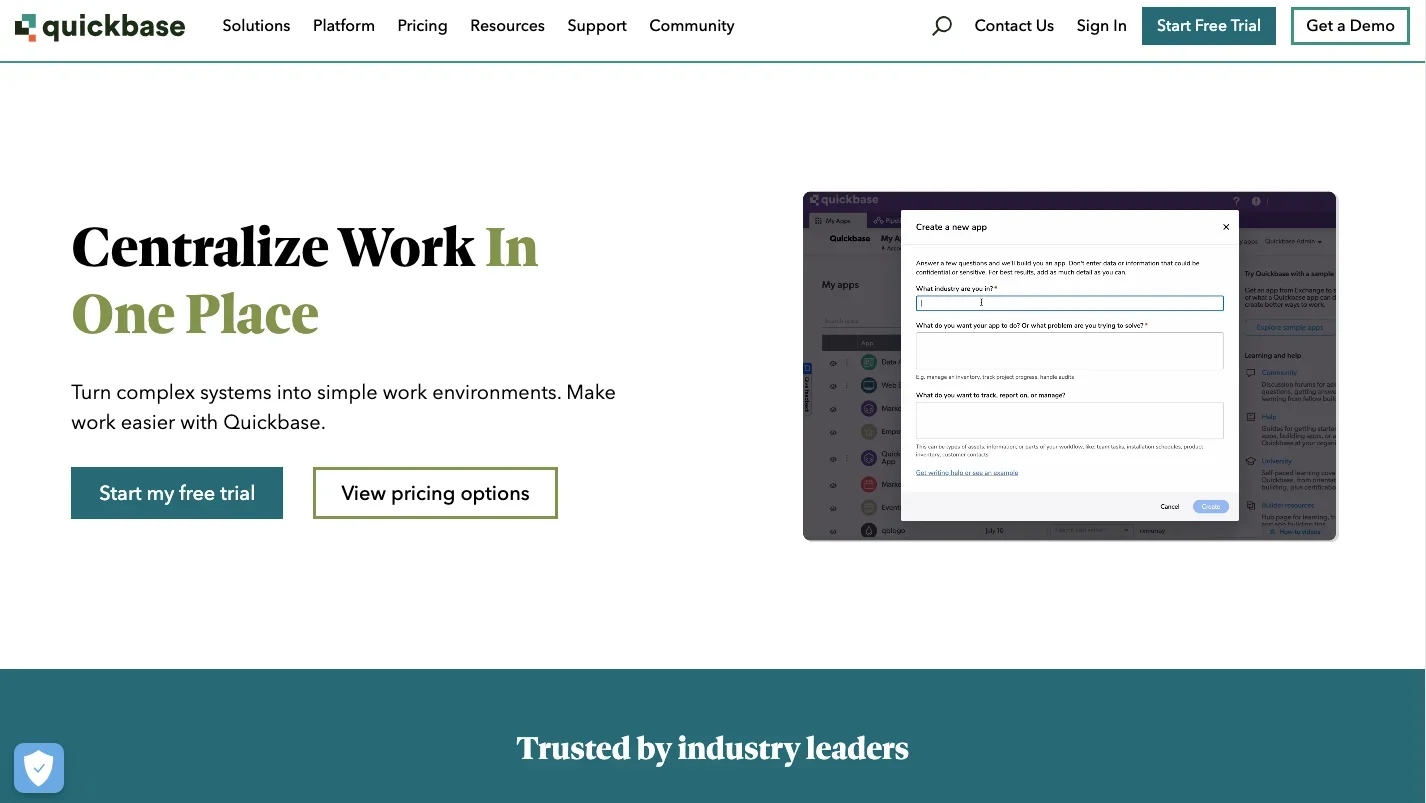
Quick Base offers a flexible low code platform tailored for businesses that need scalable applications to handle evolving requirements. Its low code platforms enable rapid customization and workflow automation, making them best for industries that need agile solutions. Quick Base’s focus on dynamic work management and integration capabilities helps organizations streamline operations without extensive IT intervention.
Notable Features of Quick Base
- Dynamic Work Management: Quick Base provides tools that streamline work processes, allowing teams to centralize tasks and manage complex workflows efficiently.
- Customizable App Builder: The platform’s intuitive app builder enables users to create tailored applications that suit unique business requirements.
- Integrations with Third-Party Systems: Quick Base integrates with other platforms, ensuring seamless data flow across tools and systems.
- Compliance and Security Controls: Features such as data encryption and audit logs support regulatory requirements, enhancing data protection.
Quick Base Pricing Plans
Quick Base offers various pricing options to cater to different organizational needs:
- Free Plan: Free for 30 days; allows teams to explore Quick Base’s low-code platform features
- Team Plan: It starts at $35/user/month (annual billing, minimum 20 users) and is suitable for smaller teams needing essential collaboration tools.
- Business Plan: Starts at $55/user/month, offering advanced features such as Gantt charts and single sign-on.
- Enterprise Plan: Custom pricing for full-scale organizational needs, including advanced security and governance APIs.
Quick Base’s low-code platform is ideal for industries such as construction, manufacturing, and government that require customized applications to streamline complex processes. Organizations in these sectors leverage Quick Base’s flexibility to manage project workflows, ensure regulatory compliance, and support efficient resource allocation.
10. Caspio – Best for Visual App Builder
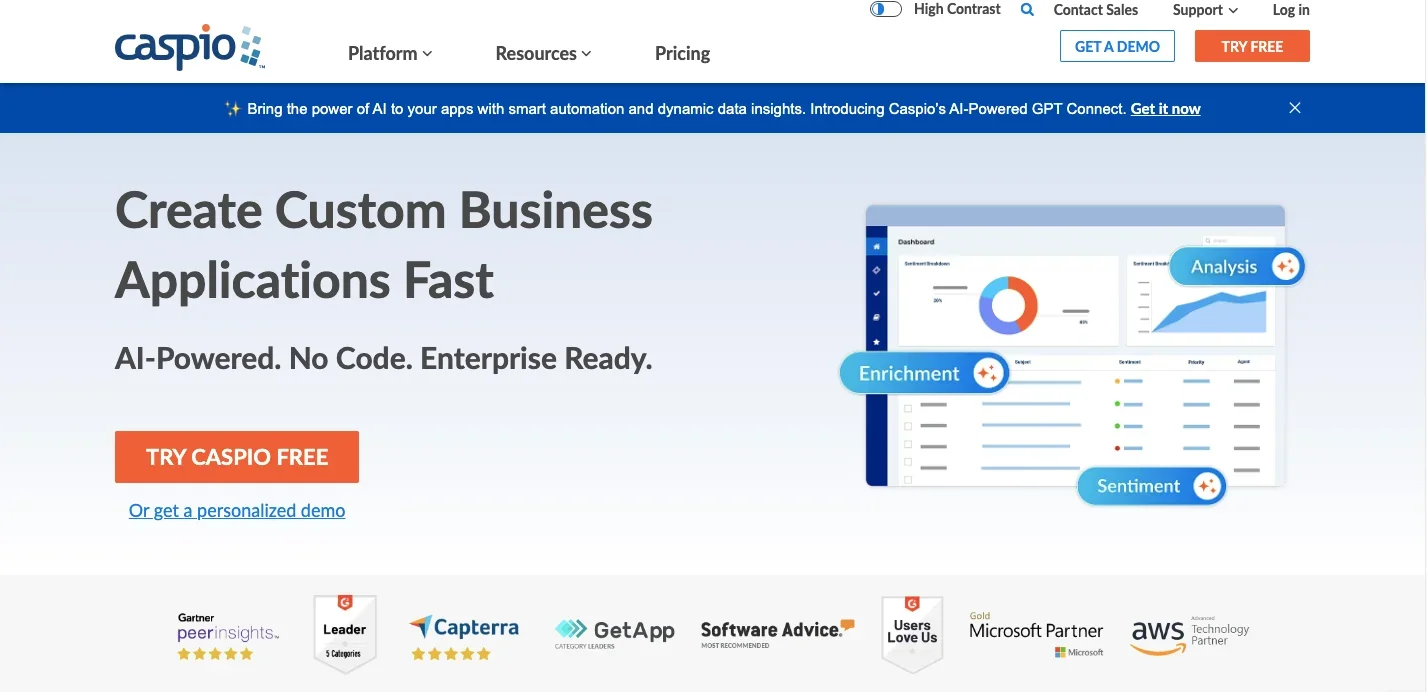
Caspio’s low code platforms empower businesses to develop scalable, custom applications quickly and without writing a single line of code. Ideal for organizations needing secure, multi-user applications, Caspio’s platform allows business professionals to create cloud applications rapidly and cost-effectively. It best suits teams prioritizing data security, extensive user access, and automated processes.
Notable Features of Caspio
- Unlimited User Access: Caspio’s pricing includes unlimited app users, making it cost-effective for businesses with extensive internal and external audiences.
- Visual App Builder: The drag-and-drop app builder enables users to create applications without technical expertise, simplifying the development process.
- Built-In Compliance: Caspio supports industry-grade security standards, including HIPAA compliance, providing peace of mind for sensitive data.
- AI-Powered Automation: Caspio’s GPT Connect leverages AI for intelligent automation, enhancing functionality with dynamic insights.
Caspio Pricing Plans
Caspio offers flexible plans to accommodate different business needs:
- Starter: $45/month for essential features, including 20 data pages and 20,000 records.
- Professional: $540/month, ideal for businesses needing advanced features and increased data limits.
- Enterprise: $2,025/month for enterprise-grade features and high performance.
Caspio’s low code platforms are ideal for industries like healthcare, government, and education, where security, scalability, and multi-user access are crucial. Organizations in these fields use Caspio to build patient portals, public service applications, and internal data management systems, benefiting from the platform’s secure, scalable infrastructure and ease of use.
Key Takeaway
Low code platforms transform app development through easy-to-use drop interfaces and tools, accelerating processes that once demanded extensive source code and traditional development methods. With these platforms, businesses quickly create custom apps without deep knowledge of programming languages or needing many users on the development team. Low-code platforms support everything from business process management to machine learning integrations, allowing diverse use cases to flourish across industries.
When selecting the best low code tool, it’s essential to match your choice with specific needs, mainly if your team requires flexibility in business process management or compatibility with the latest software technologies. Some platforms focus on specialized functions, so understanding your goals aids in making the right decision.
Are you looking to modernize your app development process with low code platforms? At Aloa, we help businesses navigate the latest technologies to create efficient, impactful applications tailored to their goals. Let us guide your project from concept to completion, leveraging the best low code automation tools to enhance productivity and innovation.

